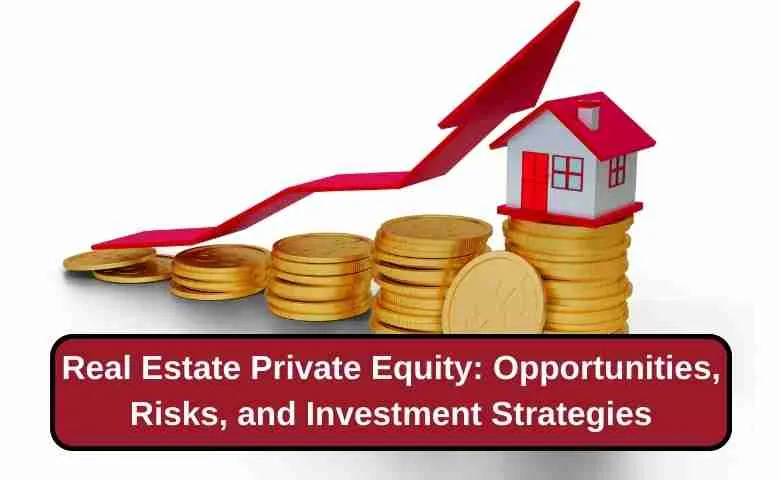Last Updated on March 8, 2023 by Admin
Real estate private equity (REPE) is an investment strategy involving pooling funds from accredited investors to acquire, manage, and sell real estate assets for a profit. In recent years, real estate private equity has become an increasingly popular asset class due to its potential for high returns and low correlation with traditional investments like stocks and bonds. However, like any investment strategy, real estate private equity comes with risks and challenges.
Table of Contents
What is Real Estate Private Equity?
Real estate private equity is a form of investment in which private equity firms or investors invest in real estate properties or projects to generate a return. Private equity firms typically pool capital from high-net-worth individuals, institutional investors, and other sources to acquire or develop real estate assets.
Private equity investments can take many forms, including equity investments in development projects, debt investments in real estate loans, and direct ownership of real estate assets.
Private equity firms often seek to add value to their investments by improving the properties or projects they acquire through renovations, repositioning, or other operational improvements.
Real estate private equity investments are typically characterized by their longer-term investment horizons, higher levels of risk and return, and greater potential for asset appreciation than traditional real estate investments. As such, they are often targeted at sophisticated investors who are willing to take on greater risk in exchange for the potential for higher returns.
Related Posts:
- Property Valuation Made Easy With Accuracy
- What are Real Estate Companies and How do they Work?
- Realtors: How to Get Started in Real Estate
- No RESP? Use Your Home Equity for Your Child’s Education
Opportunities in Real Estate Private Equity
Real estate private equity offers investors a range of investment opportunities in various real estate assets, including office buildings, retail centers, multifamily properties, industrial properties, and hotels.
Private equity funds typically focus on value-add or opportunistic investments, seeking properties with a significant upside potential that can be realized through capital improvements, operational enhancements, or market repositioning.
Value-add investments typically involve acquiring underperforming properties due to deferred maintenance, inefficient operations, or poor management. The fund’s management team will then work to improve the property’s physical condition, implement more efficient management practices, and increase occupancy and rental rates to increase its value.
Opportunistic investments, on the other hand, typically involve acquiring distressed properties or properties in emerging markets with a high potential for appreciation. These investments may involve taking on more risk but also have the potential for higher returns.
Related Courses:
- Real Estate Economics and Finance
- Property Development and Investment Online Short Course
- Beyond Smart Cities: Emerging Design and Technology
- Real Estate Finance and Investment online short course
Risks and Challenges of Real Estate Private Equity
Despite the potential for high returns, real estate private equity investments come with several risks and challenges. One significant challenge is the illiquidity of these investments.
Unlike publicly traded stocks, private equity investments are typically held for several years, making it challenging to sell them before the investment’s term ends.
Additionally, real estate private equity investments are typically only available to accredited investors, which limits the pool of potential investors.
Another significant risk is the potential for unexpected expenses, such as unexpected repairs or legal fees, that can eat into returns. Investors must carefully consider the fund’s track record, management team, and investment strategy before committing capital to a real estate private equity fund.
Investment Strategies in Real Estate Private Equity
To succeed in real estate private equity, investors must carefully evaluate potential investments, assess risk, and implement a sound investment strategy. Common strategies used in real estate private equity include:
- Value-Add Investing: Value-add investing involves acquiring properties with the potential for improved cash flow and increasing their value through renovations or operational improvements.
- Opportunistic Investing: Opportunistic investing involves acquiring properties in emerging markets or in distress, with the potential for significant appreciation.
- Core Investing: Core investing involves acquiring high-quality properties with stable cash flows and low risk.
- Debt Investing: Debt investing involves investing in the debt issued by real estate companies rather than the equity. This strategy typically involves less risk than equity investments, but also has lower potential returns.
Key Factors to Evaluate Before Investing in Real Estate Private Equity
Here are some of the essential things you need to consider before investing in real estate private equity.
- Diversification: Investing in real estate private equity can be risky, so diversification is key. It’s important to consider investing in multiple funds or properties to spread risk across different asset types, geographic locations, and investment strategies.
- Fees: Real estate private equity funds often come with high fees, including management fees, performance fees, and other expenses. Investors should carefully review the fund’s offering documents and understand the fee structure before investing.
- Tax implications: Real estate private equity investments can have complex tax implications, so investors should consult a tax professional before making investment decisions.
- Exit strategy: It’s important to consider the fund’s exit strategy before investing. Investors should understand how and when the fund plans to sell its assets and return capital to investors.
- Market conditions: Real estate markets can be cyclical, so investors should consider current market conditions when evaluating potential investments. Understanding the supply and demand dynamics, economic outlook, and demographic trends in the markets where the fund is investing is important.
By considering these essentials, investors can make informed investment decisions and achieve success in real estate private equity.
Identifying Promising Opportunities
To identify promising opportunities in real estate private equity, investors must conduct thorough due diligence, evaluate the fund’s management team, assess the fund’s track record, and carefully evaluate the investment strategy. Additionally, investors should consider the market conditions, supply and demand dynamics, and economic outlook when evaluating potential investments.
Top Real Estate Private Equity (REPE) firms
Here are some of the top real estate private equity funds in the world (in no particular order):
- Blackstone Group
- Brookfield Asset Management
- Carlyle Group
- KKR & Co.
- TPG Capital
- Apollo Global Management
- Starwood Capital Group
- Lone Star Funds
- Colony Capital
- Greystar Real Estate Partners
- Harrison Street Real Estate Capital
- LaSalle Investment Management
- Hines
- Ares Management Corporation
- CIM Group
It’s worth noting that the rankings of these funds can change over time based on factors such as market conditions, performance, and deal flow. Additionally, many other reputable real estate private equity funds are out there, and this list is not meant to be comprehensive.
Top Real Estate Private Equity funds in India
Here are some of the top real estate private equity funds in India (in no particular order):
- Blackstone Group
- Xander Group
- HDFC Property Fund
- Kotak Realty Fund
- ASK Property Investment Advisors
- ICICI Venture
- Piramal Fund Management
- Indiabulls Asset Management
- Motilal Oswal Real Estate
- Edelweiss Alternative Asset Advisors
It’s worth noting that the rankings of these funds can change over time based on factors such as market conditions, performance, and deal flow. Additionally, there are many other reputable real estate private equity funds in India, and this list is not meant to be comprehensive.
Conclusion
In conclusion, Real Estate Private Equity (REPE) offers investors a range of investment opportunities in various real estate assets, but it comes with significant risks and challenges. To succeed in real estate private equity, investors must carefully evaluate potential investments, assess risk, and implement a sound investment strategy. While the potential for high returns is significant, investors must be prepared for illiquidity and unexpected expenses. By carefully evaluating potential investments and implementing a sound investment strategy, investors can succeed in real estate private equity and realize significant returns.
FAQs
Private equity real estate firms invest in real estate properties and projects with the goal of generating high returns for their investors. They typically acquire properties, improve them, and then sell them at a profit.
Examples of real estate private equity firms include Blackstone Group, Brookfield Asset Management, Carlyle Group, and KKR & Co. These firms typically invest in a variety of real estate asset classes, such as commercial, residential, and industrial properties.
To get into private equity real estate, you typically need to have a strong educational background in finance or real estate, and several years of relevant work experience. Networking and building relationships with industry professionals can also be helpful in finding opportunities in the field.
The 4 main areas within private equity are venture capital, growth capital, leveraged buyouts, and distressed debt. Venture capital typically invests in early-stage companies, growth capital invests in more mature companies, leveraged buyouts involve acquiring established companies using debt financing, and distressed debt focuses on investing in the debt of troubled companies.
Investing in real estate private equity carries various risks such as liquidity, market, asset-specific, regulatory, and interest rate risks. Additionally, there are potential risks related to deal sourcing, due diligence, and asset management.
Real estate private equity firms generate returns for their investors by acquiring properties or projects at a discounted price, improving them, and then selling them at a profit. They may also generate returns through rental income or other forms of property income. Additionally, private equity firms typically charge management fees and carried interest to their investors as a percentage of the profits from the investment.


